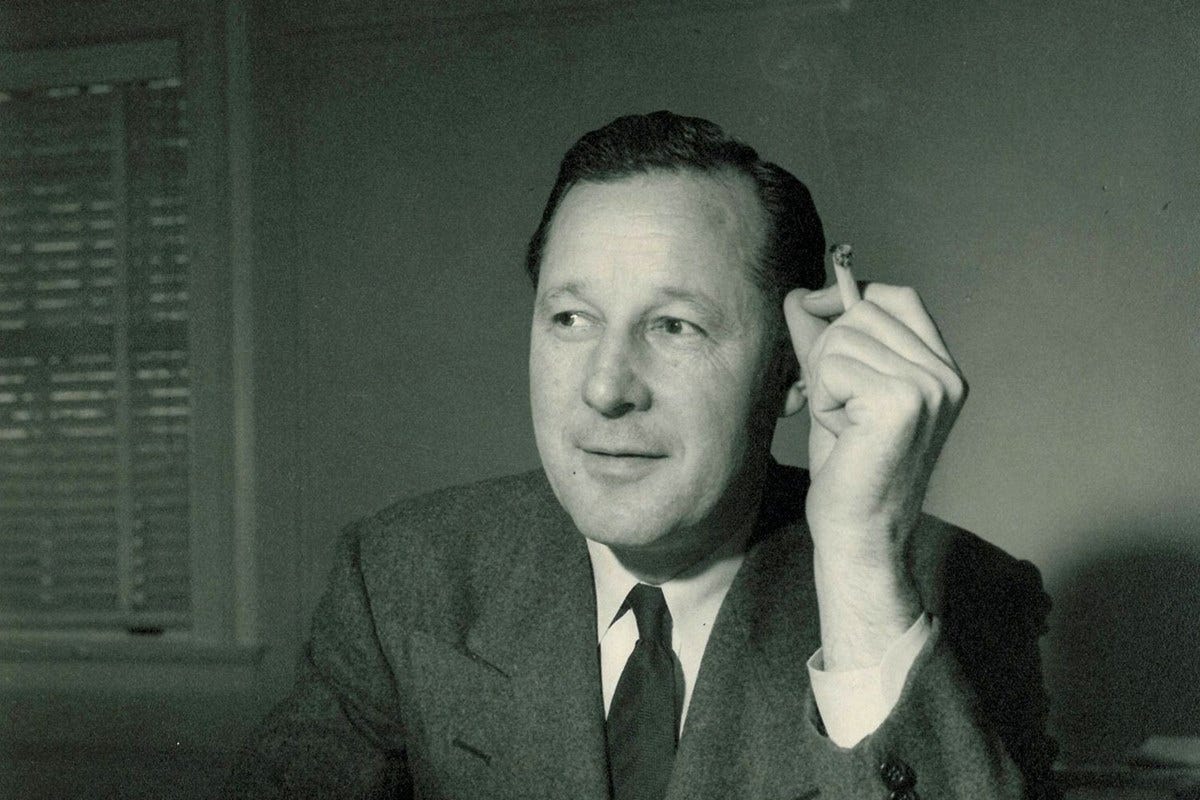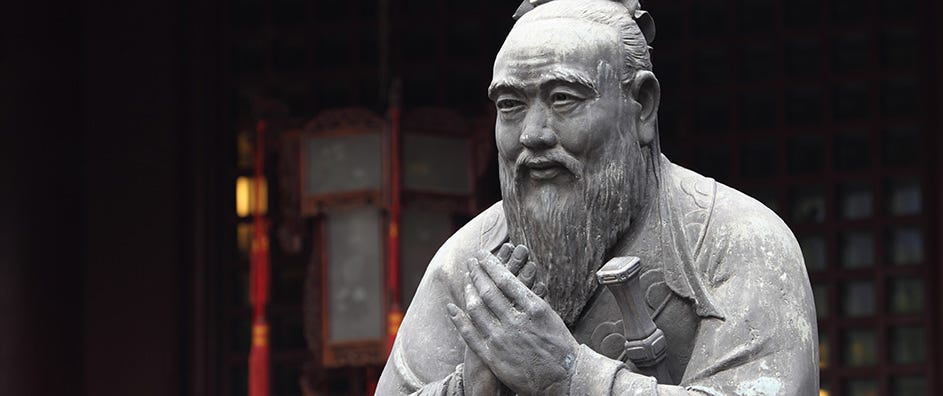Echoes of Ancient Wisdom
Liberalism, freedom's doctrine, not a word that partisans stole, is considered an Enlightenment project. It has deeper, more universal roots in the past.
Around 2700 years ago, the Chinese philosopher Lao Tzu said that “Life is a series of natural and spontaneous changes” and that to resist those changes would bring sorrow. Lao Tzu admonishes us not only to let reality be reality but to “Let things flow naturally forward in whatever way they like.” Even though liberalism, the term, gained common currency in eighteenth-century Edinburgh, it has lived at all times within all peoples to varying degrees, waiting to be expressed as morality, justice, conscience, and virtue.
A species of liberalism animates the Hebrew Talmud, which welcomes discourse and debate and leaves critical rules for living peacefully among other humans. One such story involves a goy who came to Shammai and provoked him, saying he would convert to Judaism if Shammai could teach him the entire Torah while standing on one foot. Shammai dismissed the goy.
But Rabbi Hillel welcomed him, saying:
That which is hateful to you do not do to another; that is the entire Torah, and the rest is its interpretation. Go and learn.
Presumably, Hillel was standing on one foot when he said it. Still, in doing so, he taught us toleration, graciousness in the face of provocation, and an important variation of the Golden Rule.
This is liberalism.
Hillel is known for other maxims in addition to the above. “If I am not for me, who will be for me? And when I am for myself alone, what am I? And if not now, then when?”
Your primary responsibility is to yourself, but that is not your only responsibility. You should try to expand the circle. Together, these three statements provide a framework for ethical living that balances self-sovereignty with social responsibility, all while stressing the importance of timely action.
So, yes, that means embracing rational self-interest, as you might see in Adam Smith’s allegory of the baker and butcher. But also use compassion and benevolence, such as that of the father and the neighbor, which one might find in The Theory of Moral Sentiments.
This, too, is liberalism.
A liberal “rhetoric” explains the good features of the modern world compared with earlier and later illiberal régimes—the economic success of the modern world, its arts and sciences, its kindness, its toleration, its inclusiveness, and especially its massive liberation of more and more people from violent hierarchies ancient and modern.
—Dierdre McCloskey
In the Vedic traditions, including Hinduism, Buddhism, and Jainism, the yogis speak of ahimsa. It is the basic virtue of nonviolence in speech, thought, and action. So, even as we leave room for discourse and debate, we should not wound ourselves or others with words. Ours is an ethic of respect for persons. And we should certainly not threaten or injure them if they do not threaten us.
I remember reading an account of ahimsa in, of all places, a coffee table book of daily aphorisms by Rolf Gates, a former U.S. Army special forces who later turned to yoga. As a cadet, he had heard a recruiter say that the Rangers specialized in “missions that entailed a high degree of shock and violence.” The young Gates thought that was “cool,” so joined them.
As a man of violence, I thought I was doing the right thing--and, so, for that matter, did everyone around me. As a young man, I did exactly what our society tells young men to do, and I performed my service with devotion.
Through yoga, which it turns out is more than postures and poses, Gates has kept his service and dropped the violence. Instead, he has devoted his life to ahimsa, a way of peaceful being as old as Sanskrit.
Ahimsa is the first of the Yamas, which are conscious self-regulatory practices designed to free us from being victims of our impulses. What might seem curious to the Western mind is the idea that we are not separated. In the Vedic traditions, violence is more likely when we cleave you from me. But why wouldn’t we? I have a body. You have a body. I have a self. You have a self. So, there is something rather odd in the idea that you and I are somehow one. I, Max Borders, am probably a stranger to you. The suggestion of a unified being seems like something people say after eating magic mushrooms. And yet most Westerners are familiar with the maxim love thy neighbor as thyself.
Does it matter whether we are speaking in metaphysics or metaphor?
For thousands of years, the sifus, the rabbis, and the yogis have been onto something. That something is the essence of liberalism, a philosophy that author Leonard Read summed up in simple terms:
Let anyone do anything he pleases, so long as it is peaceful.
These aren’t the words of a man who worked his way up to managing the Los Angeles branch of the U.S. Chamber of Commerce and went on to found an economics think tank.
But Read, as if hearing the echoes of a thousand wise men, offered something of a mystical way to liberalism. He thought, for example, that anyone
who acknowledges an infinite consciousness cannot help respecting fellow human beings as the apertures through whom infinite consciousness flows and manifests itself.
Sounds like some mystic.
The evocation of an infinite consciousness, of which we are all a part, isn’t your run-of-the-mill God-talk in early-60s America. For Read, it reconciles narrow individualism with a deep respect for others, who are sacred aspects of a larger self or interconnected set of selves.
This way of thinking is neither individualist nor collectivist per se but integrative.
The consequence of such integration should not be to make us all pacifists. To the extent possible, it is to keep ourselves from becoming predators, paternalists, or politicians who do not know the way of peace. Not only will the predators always be among us, but we will always have a responsibility to defend ourselves and to defend the innocent. In threatening or initiating violence, we stray from the dhamma, which is the path to liberation.
Of course, one consequence of liberalism might be a market economy where people produce and trade peacefully. And that’s good, but that is too narrow a conception. Production and exchange are but a sliver of what it means to live well within a flourishing society. The liberal’s preoccupation with economics comes from the idea of society as a vibrant living system. And as we have seen, living systems are self-organizing—living systems flow.
The idea of society as a living system lies quietly at the heart of our more familiar variants. Adam Smith, among the first to use the term liberal, thought that if societies followed “the liberal system of free exportation and free importation,” they would become a universal empire of abundance. In other words, economics was a science of letting things flow. The Wealth of Nations was published in 1776, the same year Thomas Jefferson and a group of seditious signatories held certain truths to be self-evident.
If they could only see the progress that has unfolded since.
The word liberal can be misleading, though. In today’s usage, “liberal” sits at one end of a one-dimensional spectrum, with “conservative” at the other end. That’s not what we’re talking about. In our sense, a liberal is one concerned with liberating people--from violence, oppression, and poverty.
Libertas perfundet omnia luce.
Freedom will flood all things with light.
The liberal project, begun in earnest during the Enlightenment, animated a band of polymaths. They drew up the blueprints for the first liberal order in 1776, then in Philadelphia in 1789.
Since the moment of its birth, the experiment has teetered, wobbled, and been threatened from every side—including the inside. The Republic has been challenged. The Constitution has been eroded. But it’s all still here, even if in a moribund state. Americans have endured depressions, wars, and civil wars. Yes, we are still here, but our collective belief in a liberal order is at a nadir. Steadily, including occasional, punctuated attacks, liberalism has been under siege.
Instead of transcending and including our founding ideals, Americans have turned their backs on them and blamed them for everything under the sun. Without those ideals, though, we degenerate. (Here at Underthrow, we have suggested some upgrades. And we will continue to do so.)
Today, the idea that ‘freedom will flood all things with light’ is but a candle in a windstorm, shielded by a few. We have come to a point in history where we must reconceive liberalism. Because when our belief in liberalism breaks down, our belief in one another breaks down, too.
When we try to exert too much control over each other, as Lao Tzu saw more than two thousand years ago, it will bring sorrow.






I've left a comment and a link to this article by Max on Matt Taibbi's Racket News post: Tracking Orwellian Change: New Meanings of "Deep State" and "Working Class" - https://www.racket.news/p/tracking-orwellian-change-new-meanings